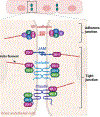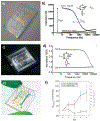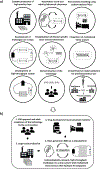Organ-On-A-Chip Models of the Blood-Brain Barrier: Recent Advances and Future Prospects
- PMID: 35978444
- PMCID: PMC9529899
- DOI: 10.1002/smll.202201401
Organ-On-A-Chip Models of the Blood-Brain Barrier: Recent Advances and Future Prospects
Abstract
The human brain and central nervous system (CNS) present unique challenges in drug development for neurological diseases. One major obstacle is the blood-brain barrier (BBB), which hampers the effective delivery of therapeutic molecules into the brain while protecting it from blood-born neurotoxic substances and maintaining CNS homeostasis. For BBB research, traditional in vitro models rely upon Petri dishes or Transwell systems. However, these static models lack essential microenvironmental factors such as shear stress and proper cell-cell interactions. To this end, organ-on-a-chip (OoC) technology has emerged as a new in vitro modeling approach to better recapitulate the highly dynamic in vivo human brain microenvironment so-called the neural vascular unit (NVU). Such BBB-on-a-chip models have made substantial progress over the last decade, and concurrently there has been increasing interest in modeling various neurological diseases such as Alzheimer's disease and Parkinson's disease using OoC technology. In addition, with recent advances in other scientific technologies, several new opportunities to improve the BBB-on-a-chip platform via multidisciplinary approaches are available. In this review, an overview of the NVU and OoC technology is provided, recent progress and applications of BBB-on-a-chip for personalized medicine and drug discovery are discussed, and current challenges and future directions are delineated.
Keywords: blood-brain barriers; disease modeling; drug discovery; organ-on-a-chips; personalized medicine.
© 2022 Wiley-VCH GmbH.
Conflict of interest statement
Conflict of Interest
The authors have no conflict of interest.
Figures











References
-
- Association A. s., Alzheimer’s & Dementia 2018, 14 (3), 367–429. DOI 10.1016/j.jalz.2018.02.001. - DOI
Publication types
MeSH terms
Grants and funding
LinkOut - more resources
Full Text Sources
Medical

